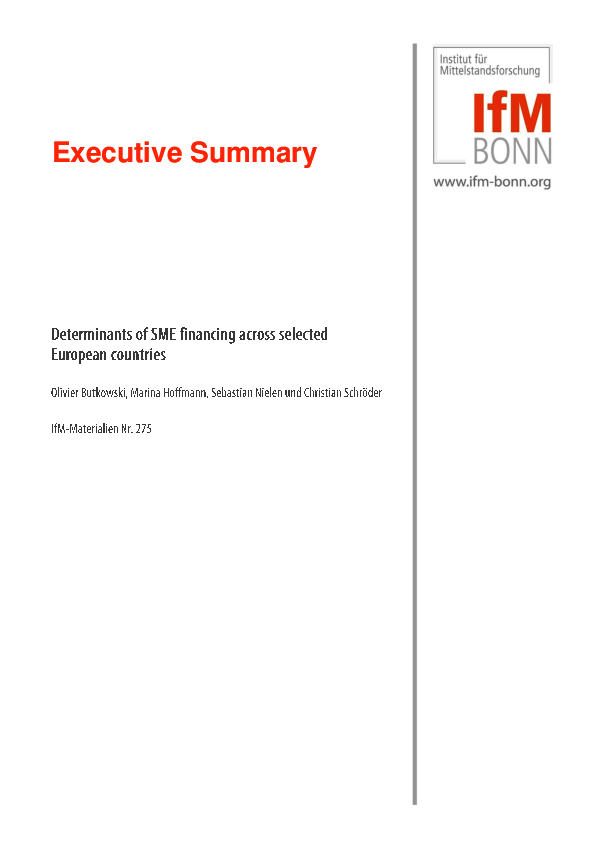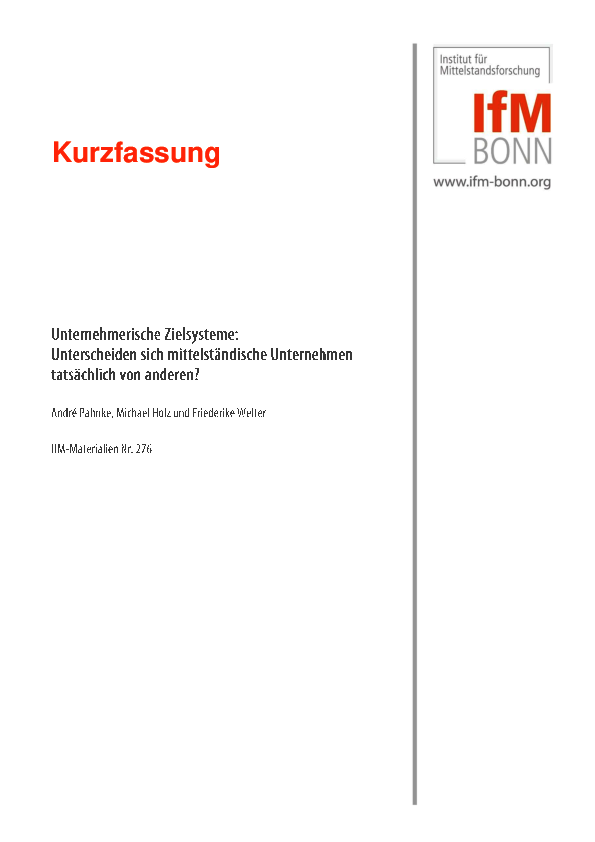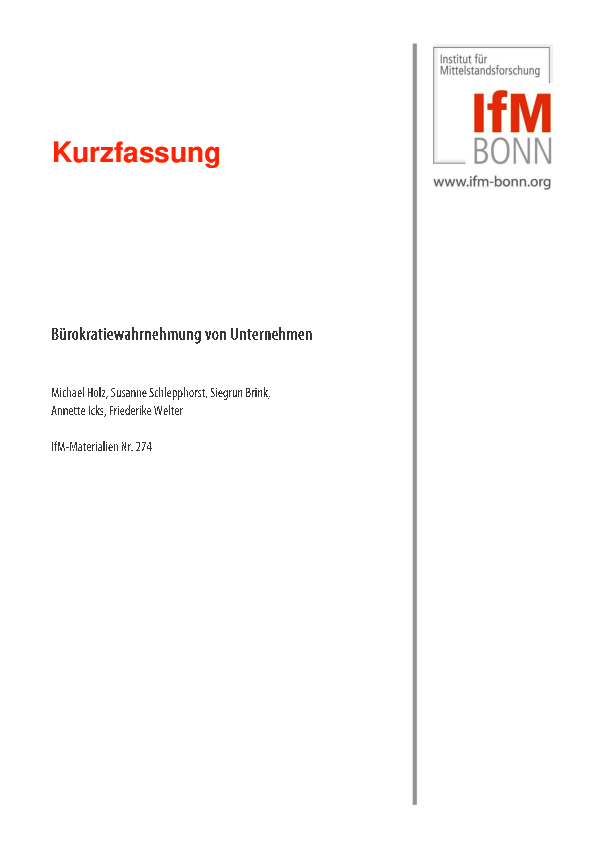Publications
IfM Bonn publishes its research findings primarily in its publication series: study results are published as "IfM-Materials" - or in condensed form as a "Denkpapier" (summary). Statistical analyses and results appear in the series "Daten und Fakten". Discussion and technical papers from all research areas are published as "Working Papers".
In addition, until 2012 selected articles were published in the series "Schriften zur Mittelstandsforschung" (Gabler Verlag). Under the "External Publications" tab, you find numerous essays by IfM researchers that have appeared in (peer-reviewed) specialist journals and external publication series.
552 Results
External publication | 2019 Productivity of small and medium sized enterprises in Germany
The study examines the labor productivity of small and medium-sized enterprises (SMEs).
External publication | 2019 Digitizing value chains: How SMEs can overcome their challenges
This paper gives some insights on how small and medium-sized enterprises (SMEs) are challenged by the process of digitization and a brief overview of important measures that have been put in place to support SMEs in digitizing their businesses in Germany.

Working Papers | 2019 The Effect of Migrants' Resource Endowments on Business Performance
This paper questions the stereotypical image of migrant-led companies as being less successful than native-led businesses.
External publication | 2019 The Missing Entrepreneurs 2019
The Missing Entrepreneurs 2019 is the fifth edition in a series of biennial reports that examine how public policies at national, regional and local levels can ...
External publication | 2019 Crises of SMEs: challenges, developments, and resilience of women- and migrant-led companies
This study examines the process of a business crisis of small companies of all sectors of the economy in the Frankfurt/Main (Germany) area. Particular emphasis is laid on the challenges faced by migrant- and women-led companies.
External publication | 2019 SME and Entrepreneurship Policy in Ireland
SMEs and entrepreneurs play a crucial role in the Irish economy, with SMEs accounting for more than 70% of employment.

Denkpapiere | 2019 Chinese Direct Investments in Germany: Opportunities and Risks for SMEs
With its many (medium-sized) technology leaders, Germany is increasingly attracting the interest of Chinese investors.

Working Papers | 2019 Emotions and Entrepreneurship Education: State of the Art and Future Research Agenda
In their contribution, Victor Pérez and Juha Kansikas not only give an overview of the results of previous research on "Entrepreneurship Education and Emotions" ...

Denkpapiere | 2019 The Renaissance of Protectionism: Impact on SMEs
This article examines the challenges facing internationally active SMEs in an environment increasingly characterized by trade policy conflicts and uncertainty.

IfM-Materialien | 2019 Determinants of SME financing across selected European countries
This study examines the impact on small and medium-sized enterprise (SME) financing in nine selected European countries.

Policy Brief "Entrepreneurship in Focus" | 2019 Why the start-up culture in Silicon Valley is different
Looking at the influence of the start-up environment - independent of individual entrepreneurial activity - it can be seen that the environment in Germany promotes incremental-innovative start-ups.

IfM-Materialien | 2019 Entrepreneurial target systems: Are medium-sized companies really different from others?
German SMEs are characterized - both nationally and internationally - as a special group of companies that stand out due to specific characteristics, behaviors and values.
External publication | 2019 A gendered look at entrepreneurship ecosystems
Underlying entrepreneurship ecosystems is the implicit assumption that all entrepreneurs have equal access to resources, participation, and support, as well as an equal chance of a successful outcome (venture start-up).

IfM-Materialien | 2019 Bureaucratic perception of companies
This study examines how companies perceive bureaucracy. Three different kinds of perception types can be identified, depending on the degree of perceived overall burden, the extent of efforts required to fulfil bureaucratic requirements and the degree of emotion caused by bureaucracy; the Unencumbered Type, the Pragmatic Type and the Grumbling Type.
External publication | 2019 Entrepreneurship and Context
"Entrepreneurship and Context" conveys the significant contribution Friederike Welter has made to entrepreneurship research in recent decades.

Facts and figures | 2019 Business start-ups by women - current developments
Women have always been underrepresented in the founding process in Germany. This under-representation has recently increased again.
External publication | 2019 The power of words and images: towards talking about and seeing entrepreneurship and innovation differently
Words and images are powerful: they frame the ways we perceive what entrepreneurship and innovation is and what not.

Denkpapiere | 2019 Company succession by employees - opportunities and risks
Between 2018 and 2022, the IfM Bonn estimates that every year around 30,000 family businesses in Germany will be faced with a succession issue.
External publication | 2019 Potentially Disruptive Innovations and Business Models
This study analyses how established SMEs respond to potentially disruptive innovations and business models in the course of increasing digitization.
External publication | 2019 Different strokes for different folks: The job satisfaction of the selfemployed and the intersection of gender and migration background
Migrant-run businesses are an important component of entrepreneurial ecosystems in Germany - One in ten of the companies in Germany is migrant-run.